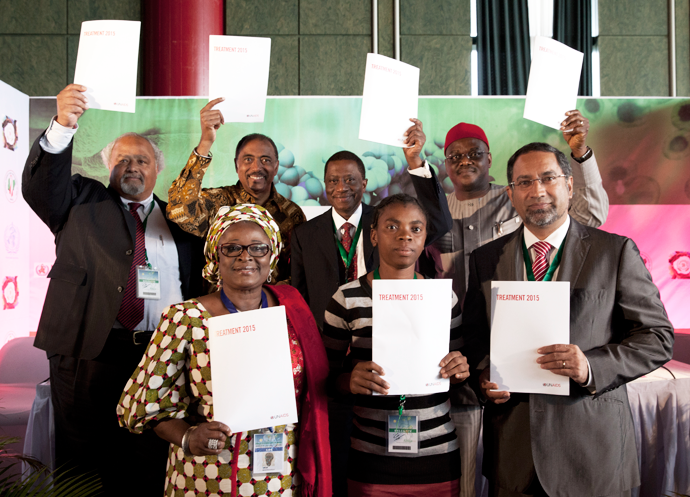
Ambassador Eric Goosby, U.S. Global AIDS Coordinator, far left, stands next to Michel Sidibé, Executive Director of UNAIDS, at the release of Treatment 2015 framework in Nigeria in July.
BC-CfE champions approach to scale up antiretroviral treatment to 15 million people worldwide by 2015
The BC Centre for Excellence in HIV/AIDS (BC-CfE) applauds the Joint United Nations Programme on HIV/AIDS (UNAIDS) for launching a new framework to accelerate action towards the aim of reaching 15 million people with antiretroviral treatment by 2015.
UNAIDS based the new framework on the consolidated guidelines recently put forward by the World Health Organization (WHO) to initiate HIV treatment sooner in order to save more lives and prevent more infections.
In B.C., this approach has been implemented for several years via the BC-CfE-developed Treatment as Prevention strategy, which calls for widespread HIV testing and earlier access to treatment for all medically eligible individuals. As part of the strategy, the Seek and Treat for Optimal Prevention of HIV/AIDS (STOP HIV/AIDS) initiative, designed to expand access to HIV/AIDS medications among hard-to-reach and vulnerable populations, was expanded province-wide in April 2013..
“The end of AIDS is within our grasp, and expanding treatment as prevention, as recommended by the 2013 WHO guidelines, will bring this epidemic to its knees,” said Dr. Julio Montaner, director of the BC-CfE. “Together, we can stop AIDS, and move towards realizing the vision of an HIV and AIDS-free generation. We should rally behind UNAIDS to make the most of this extraordinary opportunity.”
UNAIDS’ framework, entitled Treatment 2015, provides countries with methods to rapidly scale up HIV treatment access to reach this goal initially set by United Nations Member States in 2011, and furthering this target to nearly 26 million people on antiretroviral therapy as soon as possible thereafter.
“Reaching the 2015 target will be a critical milestone,” said Michel Sidibé, Executive Director of UNAIDS. “Countries and partners need to urgently and strategically invest resources and efforts to ensure that everyone has access to HIV prevention and treatment services.”
Treatment 2015 was developed in partnership with the Global Fund to Fight AIDS, Tuberculosis and Malaria and the U.S. President’s Emergency Plan for AIDS Relief (PEPFAR), as well as with the African Union and other key stakeholders, to maximize the impact of HIV treatment on the prevention of morbidity, mortality, and HIV transmission. The framework emphasizes the importance of HIV testing and counseling as gateways to expanding access to antiretroviral therapy and that further efforts are required to normalize HIV testing.
UNAIDS’ framework follows guidelines put forward by the WHO at the 7th International AIDS Society (IAS) Conference on HIV Pathogenesis, Treatment and Prevention in Kuala Lumpur, Malaysia.
Treatment 2015 outlines three fundamental pillars essential to reaching the 2015 target: increasing demand for HIV testing and treatment services; mobilizing resources and improving the efficiency and effectiveness of spending; and ensuring more people have access to antiretroviral therapy.
UNAIDS notes just 30 countries account for nine out of 10 people who are eligible for antiretroviral therapy, but who do not have access. Intense focus on scaling up HIV services in these 30 countries would have a significant impact on the trajectory of the global AIDS epidemic. The framework also calls for all countries to use the best available data to identify key geographical settings and populations with high HIV prevalence and disproportionate unmet need for antiretroviral therapy.
In B.C., since 1996, the number of HIV-positive individuals receiving treatment has increased from 837 to more than 7,000 in 2012, and HIV-related morbidity and mortality have both declined by approximately 90 per cent since the early 1990s. The number of new HIV diagnoses fell from approximately 900 per year prior to 1996 to 238 in 2012. {photo caption: Michel Sidibé, Executive Director of UNAIDS}
“Scaling up access to antiretroviral treatment is critical to achieving an AIDS-free generation.”
– Ambassador Eric Goosby, U.S. Global AIDS Coordinator in a news release announcing Treatment 2015
